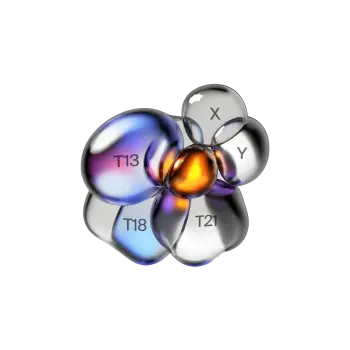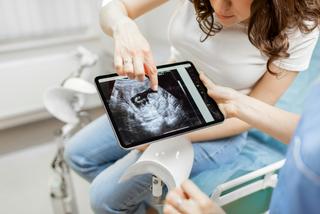Chromosome 18 is one of the 23 pairs of chromosomes found in human cells and is crucial for our development and health. It contains approximately 76 million base pairs, accounting for about 2.5% of all DNA in our cells. Chromosome 18 houses over 200 genes, each playing a vital role in regulating bodily growth, organ development, and many other biological processes. Several of these genes affect fundamental body functions, such as the development of the heart and nervous system, as well as the formation of bones and skin.
Despite its importance, changes in the number or structure of chromosome 18 can lead to severe medical conditions. One of the most well-known genetic abnormalities linked to this chromosome is Trisomy 18, also known as Edwards syndrome, in which an individual has three copies of chromosome 18 instead of the usual two. This leads to serious physical and cognitive developmental problems. Edwards syndrome is often identified through prenatal tests, such as NIPT (Non-Invasive Prenatal Testing).
According to the National Institutes of Health (NIH), Trisomy 18 occurs in approximately 1 in 5,000 live births. This chromosomal abnormality is usually the result of a random event during the formation of eggs or sperm.
Symptoms of Trisomy 18
Symptoms of Trisomy 18 vary but often include:
- Severe heart defects
- Abnormal head and facial shape
- Malformed hands and feet
- Low birth weight
- Feeding and breathing difficulties
- Delayed physical and mental development
Diagnosis of Trisomy 18
The diagnosis of Trisomy 18 can be made through several methods:
Prenatal Testing
- NIPT: A common blood test performed early in pregnancy in which the mother’s blood is analyzed for fetal DNA to detect several trisomies, including Trisomy 18. Other methods of identification include:
- Ultrasound: Can detect certain physical signs of Trisomy 18.
- Amniocentesis: A sampling of amniotic fluid to identify chromosomal abnormalities.
- Chorionic Villus Sampling (CVS): A sample from the placenta to analyze the fetus’s chromosomes.
Postnatal Testing
After birth, the diagnosis can be confirmed through a blood test that analyzes the baby’s chromosomes.
Management and Treatment
There is no cure for Trisomy 18, but there are various ways to manage symptoms.
- Surgery: May be necessary to correct heart defects or other physical abnormalities.
- Medications: Can be used to manage specific symptoms such as seizures or infections.
- Physical therapy: To improve motor skills.
- Nutritional counseling: To ensure adequate nutrition intake.
- Palliative care: To improve the quality of life for children with severe symptoms.
Receiving a diagnosis of Trisomy 18 can be overwhelming. Therefore, seeking both emotional and practical support can be invaluable. Many parents find comfort in joining support groups where they can share experiences and receive advice from other families in similar situations. Additionally, genetic counselors can provide essential information about the causes of Trisomy 18 and help families understand the risks in future pregnancies.
























